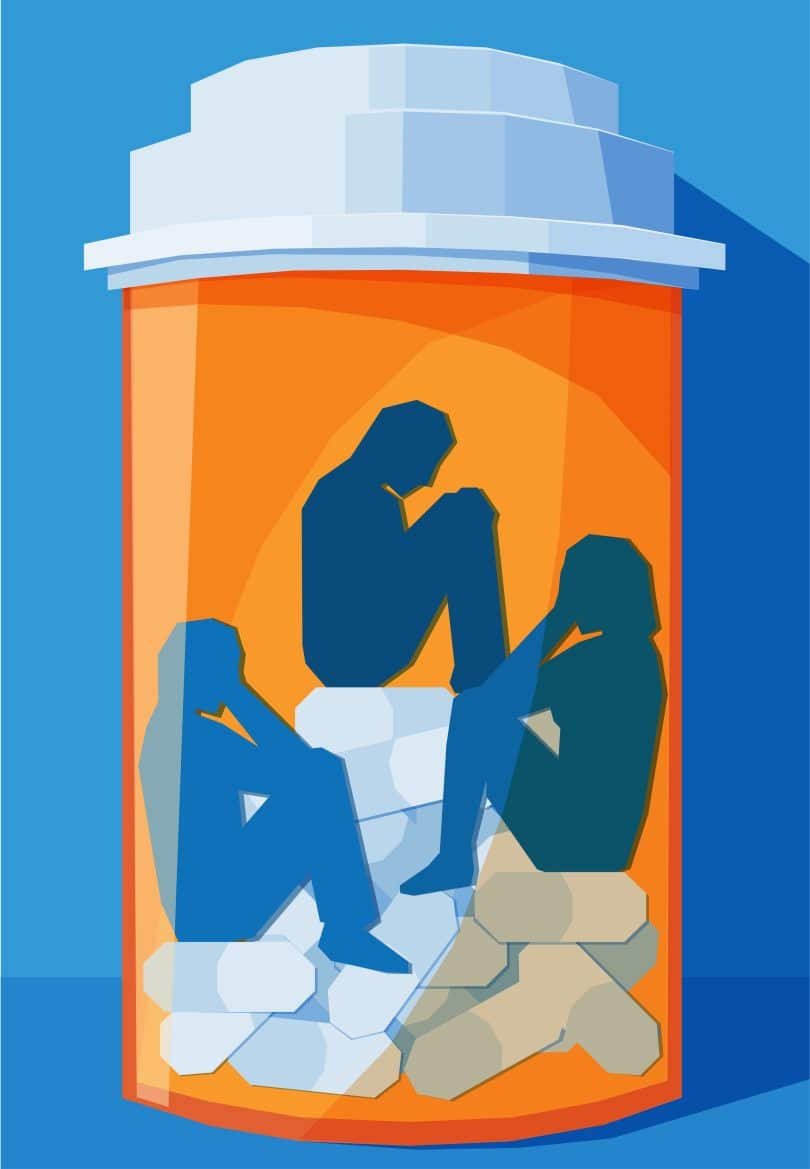We hear about opioid overdose deaths everyday in the US, but there’s a whole other downside to remember: the effects of long-term opioid use on health in general. So aside from falling down dead from overloading the system, here are some other things that can be expected if you’re popping these pills for years at a time.
Well, what about that overdose risk?
Obviously, ancillary medical problems are an issue, but what we hear about most are not the long-term effects of opioid use, but of the more immediate overdose issue. How much of an issue is this? Well pretty big, and growing at an incredibly fast rate. In fact, that’s part of the general scariness of this issue, not that it exists, but that it seems to grow massively at every juncture.
The last numbers put out on the issue came from preliminary data released by the CDC for 2021. According to this data, there were approximately 107,000 overdose deaths in 2021, up from 93,000 in 2020, and 71,000 in 2019. These numbers account for all overdose deaths from illicit drugs, but we know opioids make up the lion’s share of them. Though we don’t have a more specific breakdown for 2021, we know that of the 93,000 of 2020, that about 68,000 were related to opioids. And that of 2019 numbers, about 48,000 of the deaths came from synthetic opioids. For comparison, that year, there were less than 15,000 heroin overdoses.
This problem has gotten so out of hand, that states like New York and Rhode Island are already instituting safe-use site measures to give those in need, a safe place to use their drugs. Along with testing to ensure no fentanyl, emergency services, and other social services.
Welcome to the site. Sign up for our Cannadelics Weekly Newsletter to stay in-the-loop; and to access great offers on products like cannabis flowers, vapes, edibles, smoking devices, cannabinoid compounds (like delta-8), and a bunch more. Go ahead and pick your favorite products.
It’s even got to the point that some places, like British Columbia, in Canada, are working to decriminalize all drugs, just to make it easier for people using opioids, to do what they have to without further punishment. Whether these are actually measures to help people, though, is questionable, as they mainly seek to promote the general problem, rather than finding ways to fix it.
If you want to know how ubiquitous needle disposal apparatus is in America, consider that at this year’s MJBizCon, which took place in the Convention Center of Las Vegas, there were needle depositories in the women’s bathroom. Apparently it’s expected that literally anywhere, someone may need to get rid of needles.
Damage from long-term opioid use: colon
Maybe you started on opioids the way many people do, to deal with a pain issue. And maybe you’re one of those people that loves the way the drugs feel. It almost doesn’t matter why a person started if they’re going to take them for years of time. Maybe you’re one of those people who takes them in a controlled enough way that you don’t have to worry about overdosing on them. Well, hate to break it to you, but these are hardcore medications that your body doesn’t expect to deal with, and they come with a myriad of long-term health issues, which vary by user.
One of the big problems, is issues in the gut. Opioids decrease general activity in the guts, which is why another one of their uses is for diarrhea. It essentially works to control it, and in doing so, can create constipation instead. This effect of creating constipation isn’t acclimated to, and in fact, tends to get worse over time. Meaning long-term opioid users can develop different issues related to their guts and colon.
Take Matthew Perry, for example, who we all know as Chandler from the long-running Friends. Throughout his professional life we’ve heard different stories of his issues with drugs, but perhaps the most daunting came recently from an autobiography he put out. In it, he details how his colon burst as a result of opioid activity in the guts. In his case, the incident led to a two-week coma, and nine-months with a colostomy bag. For anyone unfamiliar with the latter term, it’s a bag worn outside the body, which is hooked up directly to the body, and which collects the feces, as they can no longer go through the damaged colon. Sound like a fun way to conduct your social life?
This happens due to the colon stretching out of shape, which it can’t always heal from. If a person already has a bowel issue, opioids can make it worse, even causing perforations, which is apparently how Perry ended up in the situation he did. What happened to Perry might be one of the rarer cases, but with increased use of these medications, rare cases become more of a norm.
Damage from long-term opioid use: blood-oxygen levels and endocrine system
Many aspects of opioids are acclimated to with regular use. This unfortunately can include the effects on pain and sedation, but doesn’t include the effects on breathing. Opioid are known for depressing the respiratory center of the brain, the part that controls breathing. If enough is taken, a person can stop breathing, and this is how many people overdose.
However, even if a person doesn’t die, this can also lead to lowered blood-oxygen levels. This happens a lot when doses are increased, which becomes standard for these medications since other effects, like pain-relieving effects, are acclimated to, leading to a need for more to get the same relief. As large increases are often experienced in a short period of time, this creates a problem with users having low blood-oxygen levels.

And then there are the effects on testosterone. Called hypogonadism, this applies to both men and women with extended use of the medications, and means a fall in testosterone levels. As these issues become more evident through time and increased overall use of the medications, this issue has presented itself, but with little known as to how reversible the effects are.
What has been noticed as well, are symptoms like amenorrhea in women, reduced desire for sex, as well as infertility (in both sexes), and erectile dysfunction in men.
Damage from long-term opioid use: the brain and other issues
Let’s be honest for a second, the reason people often get addicted to opioids, is because they’re affecting the brain, and bringing on feelings of euphoria. Anytime something is taken repeatedly that can impact the brain, there’s a question of what it’s doing long-term. In the case of these meds, perhaps it shouldn’t be surprising that long-term opioid use can cause changes in behavior and cognition, though much is reversible.
In the short term it does get in the way of the ability for concentration, as well as affecting abstract thinking. Not only that, use of the drug can lead to a diminished experience of pleasure, and can cause people to lose interest in activities that used to make them happy.

Another thing often seen, related to the sedation and disorientation effects of the drugs, is simply that people are more likely to hurt themselves. This is seen mainly though falls where bones are fractured or broken. It applies most to the elderly, and is similar to another class of drugs, benzodiazepines, which also cause sedation and disorientation.
Opioids have also shown to have an effect on the immune system and immunity. The immunomodulating effects of the drug, seen in both human and animal studies, effect immune effector cells, as well as the central nervous system, in the form of immunosuppression. This means the immune system is being suppressed, and won’t work as well. In animal studies specifically, opioids have shown to effect antimicrobial response and anti-tumor surveillance in the body.
Just to finish it all off, long-term opioid use can actually do something paradoxical, it can create a greater sensitivity to pain, which, when you think about it, is really not helpful considering their main purpose is in pain suppression. This phenomenon, called hyperalgesia, is generally only seen when there is no tolerance built to the analgesic effects of the meds. This pain doesn’t relate to the original pain suffered, and is generally less-well defined from the original pain issue. No matter how you look at it though, a pain medication that goes on to cause new forms of pain, is certainly not ideal.
Conclusion
Opioids cause much damage, both in the overdose deaths they promote, as well as the long-term issues that come from extended use. More and more, it should be asked why other, less dangerous drugs like ketamine, aren’t immediately being substituted to help ease this growing opioid issue.
Hello and welcome!! Thanks for making your way to Cannadelics.com; an independent news site where we work hard to bring you the best in cannabis and psychedelics reporting. Join us frequently to stay current on all happenings, and subscribe to the Cannadelics Weekly Newsletter, so you’re never late to get the news.







